|
|
|
Sort Order |
|
|
|
Items / Page
|
|
|
|
|
|
|
| Srl | Item |
| 1 |
ID:
190993
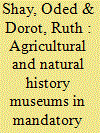

|
|
|
|
|
| Summary/Abstract |
The establishment of agricultural and natural history museums in Jerusalem (1920) and Tel Aviv (1925) by individual and institutional Jewish entrepreneurs was a corollary of the wave of exhibitions and fairs in Western countries that swept across Mandatory Palestine’s Jewish community (Yishuv) in the 1920s. Yet it also reflected Zionist ideals and perceptions and as such served as a catalyst for providing modern agricultural education to the Yishuv’s urban classes.
|
|
|
|
|
|
|
|
|
|
|
|
|
|
|
|
| 2 |
ID:
154052
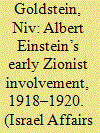

|
|
|
|
|
| Summary/Abstract |
This article presents the very beginning of Albert Einstein’s involvement on behalf of the Zionist movement. Although he was familiar with Zionist activists, it was only World War I and the rabid anti-Semitism attending it that led him to rediscover his affiliation with the Jewish people and to subscribe to the Zionist solution to their misery. Einstein tried to combine his support for the national Zionist ideals with the universal worldview to which he adhered from time immemorial, gradually coming to support establishment of the national home in Palestine as a solution for ‘The Jewish Problem’.
|
|
|
|
|
|
|
|
|
|
|
|
|
|
|
|
| 3 |
ID:
151818
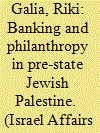

|
|
|
|
|
| Summary/Abstract |
This article focuses on the historical case study of a privately owned bank, analysing the owners’ contribution to the emergence of philanthropic discourse and practice in pre-state Jewish Palestine (1935–1945). The bank’s founder, a Jewish immigrant from Thessaloniki, drew on a long tradition of charitable giving. His philanthropic work targeted members of the local Sephardic community as its main beneficiaries, yet it was often carried out under the guise of general Zionist giving. Philanthropy with particular Sephardic goals was thus habitually construed as contributing to the general Zionist cause. The bank’s genuine commitment to the Sephardic community was not seen as antithetical, however, to business considerations, but rather as a way to advance the bank’s business interests by creating an ethnically defined market.
|
|
|
|
|
|
|
|
|
|
|
|
|
|
|
|
| 4 |
ID:
154063
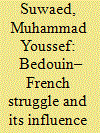

|
|
|
|
|
| Summary/Abstract |
The post-World War I partitioning of the Ottoman Empire, especially the League of Nations’ appointment of Britain and France as the mandatory powers for Palestine and Syria respectively, influenced the lives of the inhabitants of Upper Galilee. With the district left in December 1919 under French rule, the elated Christians began to avenge themselves on their long-time Bedouin opponents, who for their part supported the short-lived pan-Arab kingdom proclaimed in Damascus by Emir Faisal ibn Hussein of Mecca. With the Upper Galilee deteriorating into internecine strife, the Jews, perceived as supporters of the French, became a target for Bedouin attacks.
|
|
|
|
|
|
|
|
|
|
|
|
|
|
|
|
| 5 |
ID:
194081


|
|
|
|
|
| Summary/Abstract |
The article focuses on the story of the Na’amien swamp south of Acre, one of Palestine’s most extensive swamps, an area where many plans to control it were begun and failed throughout the Mandatory period but were only finally addressed following the establishment of the State of Israel. Colonial and Zionist environmental stances often point to similar views regarding land development and the advantages Mandatory rule provided the Zionist movement at the expense of the Arab-Palestinian population. This article will argue that the environmental British policy was not formulated merely due to similarities and common interests of the authorities and the Zionists. There was also a complex set of considerations typified by internal contradictions, varying interpretations of progress as justification for colonialism, and changing responses to local economic and political developments and to changing British interests in the European arena.
|
|
|
|
|
|
|
|
|
|
|
|
|
|
|
|
| 6 |
ID:
165588
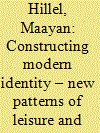

|
|
|
|
|
| Summary/Abstract |
This article explores the cultural transformation that unfolded in urban centres in Palestine during the British Mandate period. Focusing on the city of Haifa as a case study, the article sheds light on how imperial colonial interests prompted massive development of the city that triggered significant cultural changes. The article examines the ways in which different groups in Palestinian-Arab society were involved, and how they initiated, experienced and reacted to the cultural shifts. The rapid increase in the number of cafés, cabarets, bars and restaurants constituted the cornerstone of the commercial entertainment industry in Haifa during this period. By delineating the emergence of new entertainment patterns and recreation habits, the article shows how leisure became a central component in the daily lives of varied social groups. It argues that leisure played a major role as an agent of modernisation and functioned as an essential site for the construction of modern personhoods in Palestinian society.
|
|
|
|
|
|
|
|
|
|
|
|
|
|
|
|
| 7 |
ID:
141609
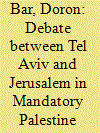

|
|
|
|
|
| Summary/Abstract |
During the Mandate era a custom of re-interment of Jewish thinkers and leaders developed. These were mostly Zionists leaders and ideologists who passed away in the Diaspora and their remains were brought to be buried in Palestine. The article deals with the conflict between Tel Aviv and Jerusalem on the right to re-inter within their boundaries Zionist leaders such as Theodor Herzl, Max Nordau, Leo Motzkin and Yehuda Leib Pinsker. Although this phenomenon was universal, the Zionist case was unique and exceptional as most of the political Zionist activity took place outside of Palestine, mostly in Europe.
|
|
|
|
|
|
|
|
|
|
|
|
|
|
|
|
| 8 |
ID:
170709
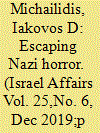

|
|
|
|
|
| Summary/Abstract |
This article deals with the case of Greek Christian refugees who fled to Cyprus and to the Middle East during WWII in an effort to point out how their settlement was related in a way to the simultaneous movement of the Jewish refugees, mainly survivors of the Holocaust, who tried to reach Mandatory Palestine. The exodus was part of a general movement from many occupied countries, mainly Greece, Poland and Yugoslavia, towards safer areas under the control of the Allies in the Middle East and Africa. It has been estimated that more than 73,000 refugees from these countries had been established in these areas in 1944. The Greek Christian refugees were placed in Nuseirat and Moses Wells camps, while Atlit remained mainly a camp for the Jewish refugees. The majority of Greek Christian refugees were repatriated by UNRRA in Greece after the liberation of the country, in 1945 and 1946.
|
|
|
|
|
|
|
|
|
|
|
|
|
|
|
|
| 9 |
ID:
146794
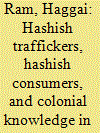

|
|
|
|
|
| Summary/Abstract |
I examine the extent to which the rise in the early 1900s of international efforts to stamp out or regulate the flow and (ab)use of hashish affected the (under)world of hashish traffickers and hashish consumers in Mandatory Palestine. A crucial phase in the global fight against cannabis, the Mandatory period serves as an excellent arena for exploring the local reverberations triggered by the reversal of the course of ‘the psychoactive revolution’, a revolution that has made drugs pervasive in human societies from the seventeenth to the nineteenth centuries. I begin by examining how hashish traffickers responded to these new conditions of control and prohibition, showing that their persistence in maintaining the illicit trade presented the authorities with unforeseen challenges. I then provide a vista into Mandatory Palestine's consuming subjects and the kinds of colonial knowledge about cannabis which helped to raise critical, racial-cum-cultural, awareness of these people, as well as to deter Jews from consuming the forbidden substance. As opposed to other regions of the British Empire (most notably India and Egypt), the history of cannabis in Palestine has not been told before. By drawing on previously untapped archival, press and literary sources, this article seeks to rectify this lacuna.
|
|
|
|
|
|
|
|
|
|
|
|
|
|
|
|
| 10 |
ID:
181016
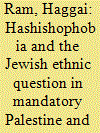

|
|
|
|
|
| Summary/Abstract |
By drawing on crime fiction, press commentaries and archival records, this article explores Jewish public discourse about hashish in Mandatory Palestine and the first two decades of the State of Israel. Fearing over-assimilation into the Levant, Jews in interwar Palestine shunned the drug, considering it a form of ‘backwardness’ linked to the realities of living among Arabs in the Middle East. Colonial knowledge about hashish (as well as Orientalist fantasies) validated these fears, appearing to confirm that hashish was an Oriental substance that animated the pathologies inhering in Arab mentalities. This knowledge survived the transition to the Israeli state by responding to new realities: the expulsion and flight of the Arab population and the country’s repopulation by Jews from the Muslim world (Mizrahim). Some of these Jews had used hashish in their countries of origin and brought the habit with them to Israel. Others began to smoke hashish in Israel due to their socio-ethnic marginalization. Although hashish smoking in Israel in the 1950s and much of the 1960s remained limited to a few thousand members of the Mizrahi underclass, it rekindled middle-class fears of Levantinization-cum-Arabicization of the Jewish state. It also assisted in further marginalizing Mizrahim in Israeli society.
|
|
|
|
|
|
|
|
|
|
|
|
|
|
|
|
| 11 |
ID:
164323
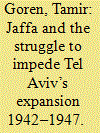

|
|
|
|
|
| Summary/Abstract |
Tel Aviv, which the Jaffa Arabs saw as the realisation of the Zionist enterprise, begot hostility to itself. Insofar as the city developed, it was perceived as a threat to Jaffa. The authorities’ approval of the enlargement of Tel Aviv’s boundaries in the early 1940s was, for the Arab side, a challenge to Jaffa’s future, and spawned the declaration of a struggle to achieve two goals: obstruction of Tel Aviv’s expansion and enlargement of Jaffa’s domain. The article examines the measures taken by the Arab side against Tel Aviv’s expansion, their gains and their implications for Jaffa.
|
|
|
|
|
|
|
|
|
|
|
|
|
|
|
|
| 12 |
ID:
178296
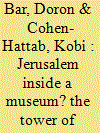

|
|
|
|
|
| Summary/Abstract |
In 1989, The Jerusalem Citadel (or Tower of David) was inaugurated as the Museum of the History of Jerusalem. The museum’s establishment stretched over two decades, highlighting the different dilemmas that were tied to the State of Israel’s attitude towards Jerusalem generally and the Old City in particular. The museum displayed Jerusalem using a historical-chronological approach, avoiding adapting it to the city’s multicultural, vibrant, diverse, and multihued society after the Six-Day War. This spared and precluded the possibility of focusing on the city’s many dilemmas, its complex population and the city’s many political questions and schisms following 1967.
|
|
|
|
|
|
|
|
|
|
|
|
|
|
|
|
| 13 |
ID:
194442


|
|
|
|
|
| Summary/Abstract |
This study investigates the contribution of Jewish women to the Levant Fair during the interwar period. In its time, the Fair became one of the major outlets that permitted Jewish women to contribute to nation-building in the pre-state period, mainly due to a dearth of otherwise suitable opportunities for women. Women participation, however, neither transformed power relations between men and women, nor expanded economic and social rights available to women at the time.
|
|
|
|
|
|
|
|
|
|
|
|
|
|
|
|
| 14 |
ID:
167685
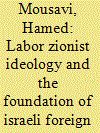

|
|
|
|
|
| Summary/Abstract |
The paper argues that during the Mandate period the Labor Zionist movement was able to successfully create a Sabra identity based on its ideology that was constructed in opposition to the presumed characteristics of the “exile Jew” and how such an identity played a central role in the formation of a security oriented foreign policy. Labor's creation of the Sabra through the "Hebrew Revolution" can be considered as one of the most successful episodes of the twentieth century in which a new identity was created in order to serve ideological goals. Labor's Zionist ideology, which sought to create a “new Jew” that would form the basis of the Jewish national movement, was translated into an identity that in contrast to the diaspora Jew relied on collectivism, agriculture, secularism, and most important of all physical strength and sacrifice in defence of the Jewish nation. This translated into a security-oriented foreign policy that heavily relied on military force and emphasized internal power and strength, which Labor elites argued could only be achieved through self-reliance and independence particularly in regards to defence issues. Such an orientation would form the basis of Israeli foreign policy for years to come.
|
|
|
|
|
|
|
|
|
|
|
|
|
|
|
|
| 15 |
ID:
168263
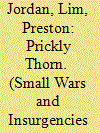

|
|
|
|
|
| Summary/Abstract |
Orde Wingate’s Special Night Squads played a key role in defeating the Great Arab Revolt of 1936–1939. Wingate’s Night Squads were distinctive in their approach to counter-insurgency warfare; in addition to bringing Arab insurgents to battle, the Night Squads proved their mettle by ‘flying the flag’ and by improving cooperation between Jewish settlers and British servicemen. Nevertheless, the Night Squad’s accomplishments and legacy must be properly situated within the broader wave of tactical innovations undertaken by the British Army throughout the Rebellion.
|
|
|
|
|
|
|
|
|
|
|
|
|
|
|
|
| 16 |
ID:
175467
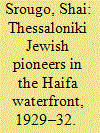

|
|
|
|
|
| Summary/Abstract |
This article traces the economic history of the small Jewish maritime community in its hometown of Thessaloniki during the 1920s and its new home of Haifa in the early 1930s. The Thessalonikians’ strong connection to port occupations made them an ideal pioneer in the Zionist scheme of creating a Jewish maritime presence in Mandatory Palestine. The Thessalonikians’ arrival in the Arab-dominated Haifa waterfront led to continuous conflict. The article examines the encounter between the Thessaloniki port culture and the Arab one in Haifa and its reflection in the core issue of the Jewish hold in the port of Haifa.
|
|
|
|
|
|
|
|
|
|
|
|
|
|
|
|
| 17 |
ID:
158159
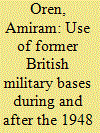

|
|
|
|
|
| Summary/Abstract |
Mandatory Palestine’s military landscape was shaped during World War II in accordance with British imperial interests. After the 1948 Arab‒Israeli war, military spatial patterns and landscapes were transformed to conform to Israel’s national interests and needs. This article deals with the transformation of the British military spatial heritage following the takeover of former British bases by the Israeli armed forces and civil institutions and its impact on the organisation and building of both the Israeli military system and the spatial, social and cultural structures of the evolving Israeli society during the 1950s.
|
|
|
|
|
|
|
|
|
|
|
|
|
|
|
|
| 18 |
ID:
155049
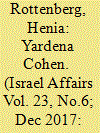

|
|
|
|
|
| Summary/Abstract |
Yardena Cohen (1910–2012), a dancer, choreographer and teacher, is considered one of the founding mothers of Hebrew dance. After studying in Austria and Germany, Cohen began developing her dance career in the early 1930s in Mandatory Palestine by creating and performing solo dances, and later on by creating festivities for the kibbutzim and teaching dance. This article investigates Cohen’s unique action and contribution to the development of Hebrew culture within the context of shaping and formulating a nation-state and a national culture for the new Jewish Yishuv. By way of doing so, it will explore Cohen’s employment of ancient materials stretching back to biblical times combined with formal frameworks inspired by German dance expressionism in an attempt to determine whether and to what extent she conformed to the Yishuv’s ideology or found a way to express her unique, and sometimes non-conformist, voice.
|
|
|
|
|
|
|
|
|
|
|
|
|
|
|
|
|
|
|
|
|